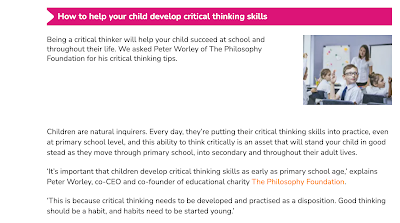1. Teaching Critical Thinking - An evidence Based Guide
Critical thinking is about reasoning and asking questions, analysing and internalising. Critical thinking also allows students to become problem solvers through active investigation. It is also about “high order thinking processes” in order to make some informed decisions.
Games to promote critical thinking
Puzzles, mazes, mystery bag, brain teasers, rebus puzzles
HOW?
Encourage agree & disagree
Asking why questions
Talk about implications / solutions
Reflections
- This reading was a reminder of why teaching Critical Thinking is important for the students learning. The benefits of critical thinking goes beyond the classroom and can be applied to any experience in education.
- As teachers, when Teaching Critical Thinking Skills, it's important to slow down the pace. Pose a question of the day as something to stimulate thinking. Create a response box that students can slot their responses in throughout the day. Debates is also a great class activity for students to partake in. Deciding whether they're for or against a proposition is effective.
2. 5 Critical Thinking Skills Kids need to Learn
- Children are naturally curious to find out how things work, to make sense of the world around them - they use their critical thinking skills.
- Children who have been taught critical thinking skills, have higher IQs and do better in language comprehension and problem-solving.
Encourage students to ask ‘why’. Ask do you agree/disagree and give reasons. Ask for clarification and if they can give you an example.
Talk about implications. When reading a story, stop in the middle and ask what do you think will happen next. Why or what would you do.
3. How to help your child develop Critical Thinking Skills
- Children who have been taught critical thinking skills, have higher IQs and do better in language comprehension and problem-solving.
- Encourage students to ask ‘why’. Ask do you agree/disagree and give reasons. Ask for clarification and if they can give you an example.
- Talk about implications. When reading a story, stop in the middle and ask what do you think will happen next. Why or what would you do.



No comments:
Post a Comment